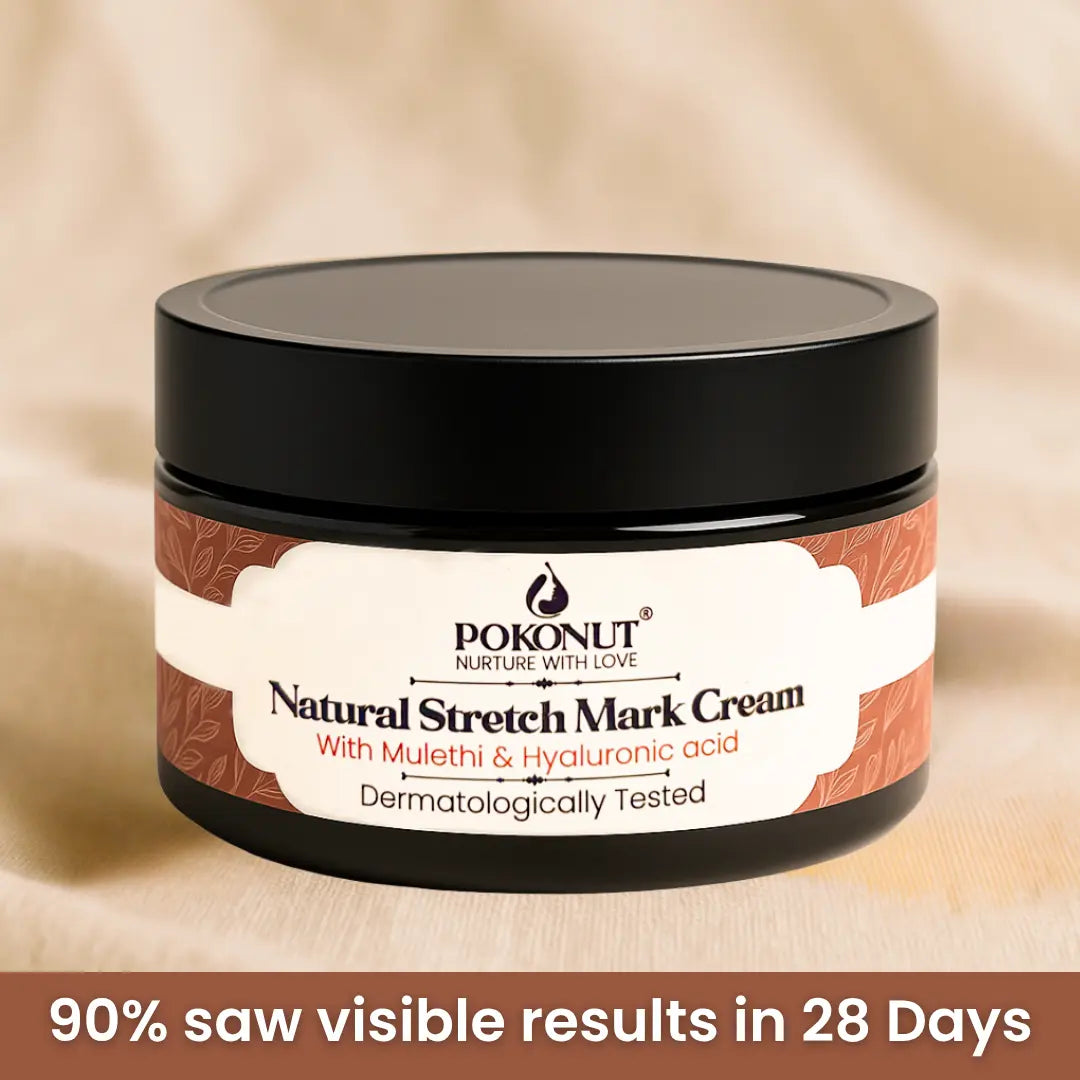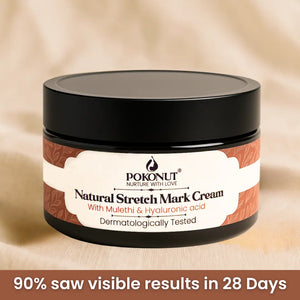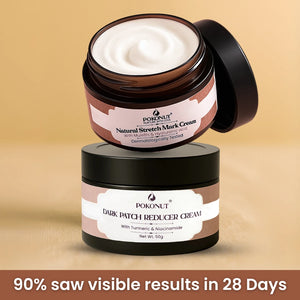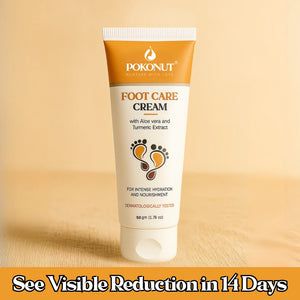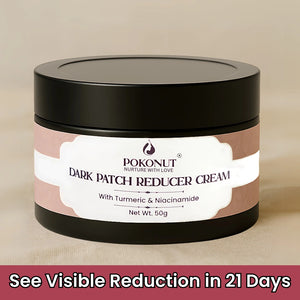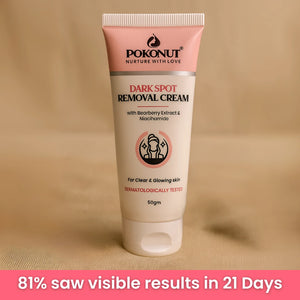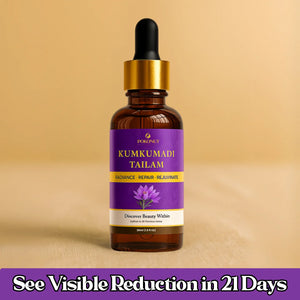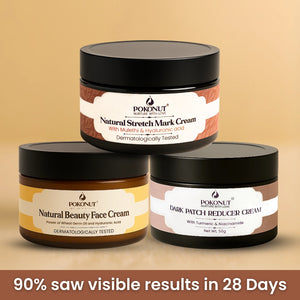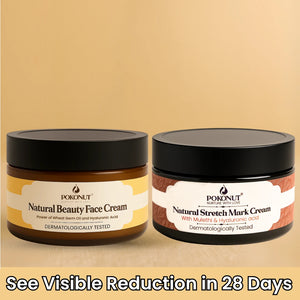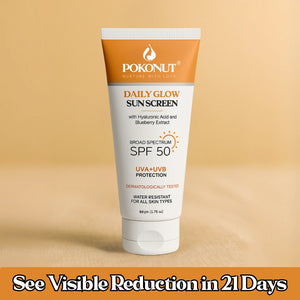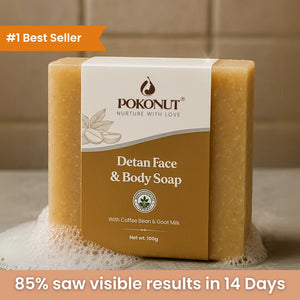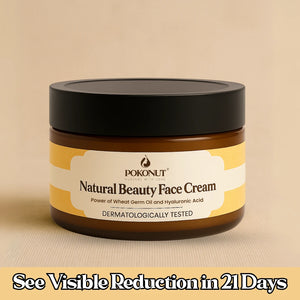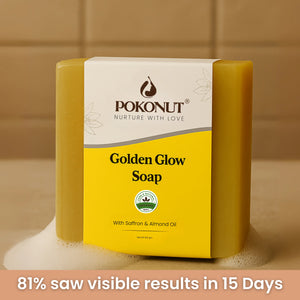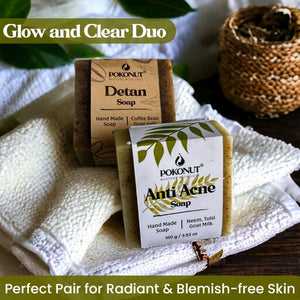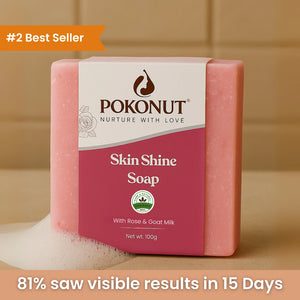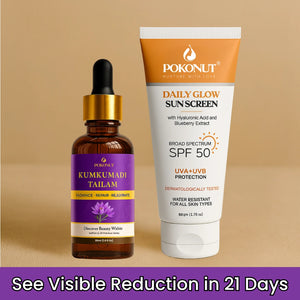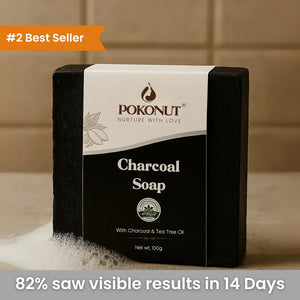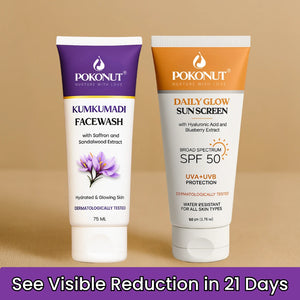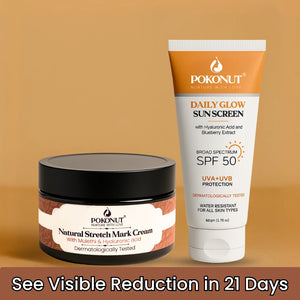Pregnancy Safe Ingredients to Look for in Stretch Mark Creams

Medically Reviewed By:
Dr. Mousumi Dash, BAMS
Written by Our Editorial Team
If you're pregnant (or recently were), you're probably seeing a surge of ads for belly oils, body butters, and creams promising to fade or prevent stretch marks. But here’s the thing most of them don’t say: not every ingredient is safe to use during pregnancy—even if it's in a so-called "natural" product.
This article breaks down what to look for in a pregnancy stretch mark cream—and why ingredient safety matters just as much as results.
Why Safe Skincare Matters During Pregnancy
Your body is doing something incredible, but that doesn’t mean you have to ignore your own comfort or confidence. Pregnancy hormones make your skin more sensitive, and some ingredients can actually be harmful when absorbed.
Choosing a maternity-safe stretch mark cream means choosing peace of mind—for both you and your baby.
Just like you’re careful about what you put on your body, it’s also important to stay informed about what you put in your body. Not sure about fruits like grapes? Here's what you need to know about grapes during pregnancy.
Pregnancy-Safe Ingredients to Look For
When picking a pregnancy stretch mark cream, make sure the formula includes ingredients that hydrate, restore elasticity, and most importantly—are safe during pregnancy.
Here’s a list of safe ingredients for stretch marks during pregnancy:
|
Ingredient |
Why It’s Great During Pregnancy |
|
Shea Butter |
Ultra-rich moisturizer packed with vitamins A & E to restore elasticity. |
|
Coconut Oil |
Natural hydrator with antimicrobial benefits—ideal for soothing itchy, stretching skin. |
|
Vitamin E |
Fights free radicals, improves skin healing, and reduces scar appearance. |
|
Jojoba Oil |
Mimics skin's natural sebum—perfect for deep, non-irritating hydration. |
|
Aloe Vera |
Soothes inflamed or irritated skin and supports healing. |
|
Centella Asiatica |
Stimulates collagen production, helping skin remain resilient. |
|
Calendula Extract |
Anti-inflammatory and calming—ideal for sensitive skin. |
Avoid retinoids, synthetic fragrances, and parabens—they’re often found in mainstream creams but not considered pregnancy-safe.
A Personal Experience: What Helped Me During Pregnancy
I’ll be honest—halfway through my second trimester, I started panicking about the deep stretch marks forming around my hips and belly. I didn’t want anything loaded with chemicals, so I turned to a friend who recommended this pregnancy stretch mark cream from Pokonut.
It’s plant-based, feels incredible going on, and didn’t leave that greasy film a lot of creams do. What really sold me? It’s made for moms—no retinol, no parabens, just ingredients I actually recognized.
What to Avoid in a Stretch Mark Cream for Pregnancy
To protect yourself and your baby, skip the following:
-
Retinoids (Vitamin A derivatives)
-
Salicylic acid
-
Synthetic fragrances
-
Phthalates
-
Chemical preservatives (like parabens)
Not sure about an ingredient? A quick online search or check with your OB-GYN can help.
How to Use a Pregnancy Stretch Mark Cream Effectively
Even the best belly cream for pregnancy won’t work if it sits on the shelf. Here's how to make it part of your self-care routine:
-
Start early – Ideally, in the first trimester.
-
Use it twice daily – Morning and night for consistent hydration.
-
Massage in gently – Circular motions boost blood flow and absorption.
-
Keep using it post-birth – Your skin still needs support while it recovers.
Why Natural Matters
Pregnancy is not the time to gamble with harsh synthetics. Choosing a natural stretch mark remedy means avoiding toxins and focusing on what your skin truly needs: nourishment, moisture, and support.
If you’re looking for a tried-and-tested, clean product, check out this cream which is said to be the best pregnancy stretch mark cream. It’s packed with all the skin-loving ingredients listed above and none of the stuff you want to avoid.
Final Thoughts
Whether you’re a first-time mom or adding another little one to your family, your body is doing powerful work. Stretch marks are natural, but caring for your skin with the right ingredients can make a big difference in comfort and confidence.
Looking for a trusted option? Explore Pokonut’s pregnancy stretch mark cream —a safe, plant-based solution designed specifically for expecting moms.
FAQs
1. What is the best stretch mark cream to use during pregnancy?
Answer: The best stretch mark cream for pregnancy is one that is free from harmful ingredients like retinoids and parabens, and instead uses natural moisturizers like shea butter, coconut oil, and aloe vera. Look for creams specifically labeled as pregnancy-safe or maternity-safe.
2. Are stretch mark creams safe to use during pregnancy?
Answer: Not all creams are safe. Some contain ingredients that can be harmful to a developing baby. Always check the label for pregnancy-safe ingredients and avoid retinoids, synthetic fragrances, and harsh chemicals.
3. When should I start using stretch mark cream in pregnancy?
Answer: You should start as early as the first trimester, ideally around weeks 8–12. Early and consistent use helps improve skin elasticity and reduce the severity of stretch marks.
4. Can stretch mark creams prevent stretch marks completely?
Answer: No cream can guarantee 100% prevention, as genetics and rapid weight changes play a big role. However, regular use of a pregnancy stretch mark cream can help minimize their appearance and keep your skin healthier and more elastic.
5. Is it safe to use stretch mark cream while breastfeeding?
Answer: Most pregnancy-safe creams are also safe while nursing, especially if they use edible-grade or plant-based ingredients. Still, avoid applying directly around the nipple area unless the product is specifically designed for it.
6. What ingredients should I avoid in a pregnancy stretch mark cream?
Answer: Avoid retinoids, parabens, phthalates, salicylic acid, and synthetic fragrances. These may cause irritation or pose risks during pregnancy.
7. How often should I apply stretch mark cream while pregnant?
Answer: Apply at least twice a day—morning and night. Consistency is key to seeing the best results.
8. Do natural remedies like coconut oil or shea butter work for pregnancy stretch marks?
Answer: Yes, many natural ingredients like coconut oil, shea butter, and aloe vera are effective in moisturizing skin and improving elasticity. They’re also generally safe during pregnancy.
9. Is there a difference between regular stretch mark creams and pregnancy-safe ones?
Answer: Yes. Regular creams may contain active ingredients like retinol that are not safe for pregnant women. Pregnancy stretch mark creams are specifically formulated without harmful chemicals.
10. What areas should I apply stretch mark cream to during pregnancy?
Answer: Focus on the belly, breasts, hips, thighs, and lower back—anywhere the skin is stretching rapidly.
About Doctor :

